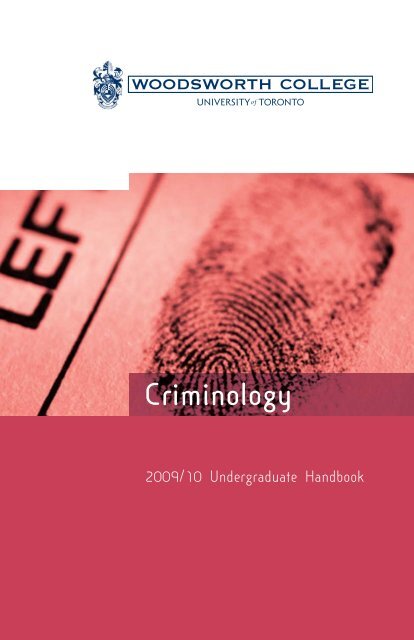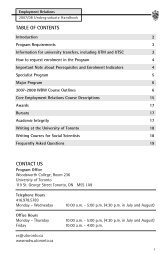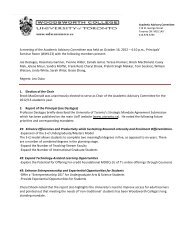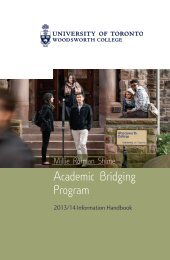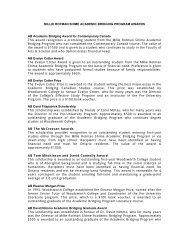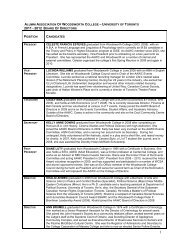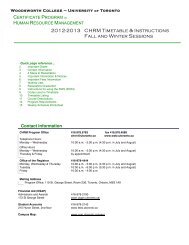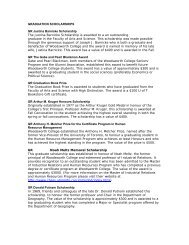Criminology - Woodsworth College - University of Toronto
Criminology - Woodsworth College - University of Toronto
Criminology - Woodsworth College - University of Toronto
- No tags were found...
Create successful ePaper yourself
Turn your PDF publications into a flip-book with our unique Google optimized e-Paper software.
<strong>Criminology</strong>2009/10 Undergraduate Handbook
<strong>Criminology</strong>2009/10 Undergraduate HandbookHow to Apply to the <strong>Criminology</strong> Program -Application Process for <strong>University</strong> Transfers including UTM and UTSCStudents transferring to the <strong>University</strong> <strong>of</strong> <strong>Toronto</strong> (Faculty <strong>of</strong> Arts and Science, St. GeorgeCampus) from another university or from the <strong>University</strong> <strong>of</strong> <strong>Toronto</strong> Mississauga or the<strong>University</strong> <strong>of</strong> <strong>Toronto</strong> Scarborough should contact Admissions and Awards at 416.978.2190or www.adm.utoronto.ca for all undergraduate admission inquiries.Admission to the <strong>Criminology</strong> program is determined only after the transfer creditassessment is complete. Students seeking admission to the program based only on transfercredits should have a minimum 76% overall average in their previous studies. Results willbe communicated to the student in writing, by the Faculty <strong>of</strong> Arts and Science, in thetransfer credit assessment letter.Admission to the specialist program is determined by the <strong>Criminology</strong> Program Office.Transfer students who have previously studied criminology, who have been granted aminimum <strong>of</strong> 8 full transfer credits and have an overall 'A-' average in their previousundergraduate degree studies may submit a written request along with a copy <strong>of</strong> theirtranscripts and a copy <strong>of</strong> the transfer credit assessment letter to the UndergraduateCoordinator. The deadline is May 18, 2009. Results will be available on ROSI beginningJune 30, 2009.Transfer Credits for Newly Admitted StudentsTransfer credits are assessed by the Faculty <strong>of</strong> Arts and Science. It is important for transferstudents to submit their request for transfer credits as soon as possible after receiving an<strong>of</strong>fer <strong>of</strong> admission.If you have any questions regarding transfer credits please check the Arts and Sciencewebsite at www.artsci.utoronto.ca/current/undergraduate/tc4 W o o d s w o r t h C o l l e g e U n i v e r s i t y o f T o r o n t o
The Major ProgramThe major program in <strong>Criminology</strong> consists <strong>of</strong> seven full courses or their equivalent,including at least two 300+ series courses. Courses 2-3 are prerequisites for upper levelWDW courses.Course 1One 100Y-series course in ECO or HIS or PHL or POL or SOCCourse 2* WDW200Y1 Introduction to <strong>Criminology</strong> orWDW205H1 Introduction to <strong>Criminology</strong> &WDW210H1 Criminal JusticeCourse 3 WDW220Y1 Introduction to Criminal Law and ProcedureCourse 4-5Two full credits from:WDW300H1WDW310H1WDW320H1WDW335H1WDW340H1WDW343H1WDW350Y1WDW350H1WDW360H1WDW365H1WDW370H1WDW375H1WDW380H1WDW383H1WDW385H1WDW387H1WDW388H1WDW389Y0WDW391H1WDW392H1WDW393H1WDW394H1WDW395H1WDW396H1WDW397Y1WDW405H1WDW420H1WDW425H1WDW480H1Crime: Theory and PolicyCrime and Society in Canadian HistoryThe Prosecution ProcessPolicingPenologyComparative Criminal JusticeResearch Methods in <strong>Criminology</strong> orResearch Methods in <strong>Criminology</strong>Law and PsychiatryCrime and MindYouth JusticeYoung OffendersCrime and GenderImmigration and CrimeRepresenting Crime and AuthorityLegal Regulation <strong>of</strong> MoralityDrugs, Crime and ControlTopics in <strong>Criminology</strong>: Legal RightsTopics in <strong>Criminology</strong>: Race, Colonialism and ViolenceTopics in <strong>Criminology</strong>: Hate CrimeTopics in <strong>Criminology</strong>: The Criminological ImaginationTopics in <strong>Criminology</strong>: Managing DissentIndependent StudyResearch ParticipationResearch ParticipationRisk, Uncertainty and Criminal JusticeCurrent Issues in Criminal LawInternational Criminal LawInterpersonal Violence7
The Specialist ProgramThe specialist program in <strong>Criminology</strong> consists <strong>of</strong> ten full courses or their equivalent,including at least four 300+ series courses, one <strong>of</strong> which must be a 400-series course. Atleast seven WDW <strong>Criminology</strong> full credits must be completed. Courses 2-3 areprerequisites for upper level WDW courses.Course 1One 100Y-series course in ECO or HIS or PHL or POL or SOCCourse 2 WDW200Y1 Introduction to <strong>Criminology</strong> orWDW205H1 Introduction to <strong>Criminology</strong> &WDW210H1 Criminal JusticeCourse 3 WDW220Y1 Introduction to Criminal Law and ProcedureCourse 4-6 WDW300H1 Crime: Theory and PolicyWDW320H1 The Prosecution ProcessWDW335H1 PolicingWDW340H1 PenologyWDW350H1 Research Methods in <strong>Criminology</strong>Course 7One full credit from:WDW310H1 Crime and Society in Canadian HistoryWDW343H1 Comparative Criminal JusticeWDW360H1 Law and PsychiatryWDW365H1 Crime and MindWDW370H1 Youth JusticeWDW375H1 Young OffendersWDW380H1 Crime and GenderWDW383H1 Immigration and CrimeWDW385H1 Representing Crime and AuthorityWDW387H1 Legal Regulation <strong>of</strong> MoralityWDW388H1 Drugs, Crime and ControlWDW389Y0 Topics in <strong>Criminology</strong>: Legal RightsWDW391H1 Topics in <strong>Criminology</strong>: Race, Colonialism and ViolenceWDW392H1 Topics in <strong>Criminology</strong>: Hate CrimeWDW393H1 Topics in <strong>Criminology</strong>: The Criminological ImaginationWDW394H1 Topics in <strong>Criminology</strong>: Managing DissentWDW395H1 Independent StudyWDW396H1 Research ParticipationWDW397Y1 Research ParticipationWDW450H1 <strong>Criminology</strong> Research Project9
<strong>Criminology</strong>2009/10 Undergraduate HandbookCourse 8Course 9-10One credit from:WDW405H1 Risk, Uncertainty and Criminal JusticeWDW415H1 Crime and PoliticsWDW420H1 Current Issues in Criminal LawWDW425H1 International Criminal LawWDW480H1 Violence and ControlTwo full credits from:HIS332H1 Crime and Society in England 1500-1800HIS355H1 Crime and Society in England since 1800PHL271H1 Law and MoralityPHL370H1 Issues in Philosophy <strong>of</strong> LawPOL332Y1 Courts, Law and PoliticsPSY201H1 Statistics IPSY202H1 Statistics IIPSY220H1 Introduction to Social PsychologyPSY240H1 Introduction to Abnormal PsychologyPSY328H1 Psychology and the LawSOC212Y1 Deviance and ControlSOC213Y1 Law and SocietySOC306Y1 Sociology <strong>of</strong> Crime and DelinquencySOC358H1 Cities and Social PathologyTRN305Y1 Basic Principles <strong>of</strong> LawOr additional WDW <strong>Criminology</strong> courses not already taken* Note: WDW 200Y1 (Introduction to <strong>Criminology</strong>) has been divided into two half-courses,WDW 205H1 (Introduction to <strong>Criminology</strong>) and WDW 210H1 (Criminal Justice). Both halfcoursesare required for the program, and students must complete both half-courses andWDW220Y before enrolling in third or fourth year <strong>Criminology</strong> courses. Prerequisites will bechecked for all WDW courses.10 W o o d s w o r t h C o l l e g e U n i v e r s i t y o f T o r o n t o
2009-2010 Course OutlinesThe outlines provide a detailed overview <strong>of</strong> the themes, formats and requirements for<strong>Criminology</strong> courses <strong>of</strong>fered in 2009-2010. This information was compiled and published inMarch 2009.***COURSE REQUIREMENTS AND TEXTS LISTED IN THE OUTLINES MAY CHANGE******DO NOT TO PURCHASE BOOKS UNTIL AFTER CLASSES START***Summer 2009WDW392H1 Topics in <strong>Criminology</strong>: Hate CrimeAllyson LunnyTopics vary from year to year, but the objective <strong>of</strong> the lecture course is to explore emergingissues in <strong>Criminology</strong>, and their social, legal, ethical and political implications.Prerequisites: WDW200Y1, WDW220Y1Making Hate a Crime: Constituting Hate Crime in CanadaThemes and FormatThe words 'hate crime' produce a chilling effect on most people. To commonsense knowledges,the deaths <strong>of</strong> Matthew Shepard, David Rosenzweig, and James Byrd Jr. are examples <strong>of</strong> themost extreme cases <strong>of</strong> 'hate crime'. But what is a 'hate crime'? How is it that acts <strong>of</strong>incitement and interpersonal violence against racial, ethnic and religious groups, sexualminorities and others have come to be constituted as such? This course interrogates suchcommonsense beliefs and asks how is it that we determine a criminal act is a 'hate crime'?It is the position <strong>of</strong> this course that 'hate crime' is a highly contested and politicized term.This is not to say that 'hate crime' is a fictionalized and merely politicized notion. Rather,that 'hate crime', like many other criminal justice issues, is experienced and negotiated in apolitical, as well as a criminolegal, field. As a result, the readings <strong>of</strong> this course representnot only the criminal justice aspects <strong>of</strong> 'hate crime' but also its political, sociological, andpsychological dimensions. Criminal justice materials and literatures are supplemented bycritical literatures on discrimination and interpersonal violence and by popular media suchas websites and newspaper articles. While the course emphasizes the Canadian experience<strong>of</strong> 'hate crime', it also draws on international incidents and their criminal justice responses.The course begins with the experiential aspect <strong>of</strong> hate crime. We examine the acts <strong>of</strong>incitement and interpersonal violence themselves at the personal, psychological andsymbolic levels. A discussion <strong>of</strong> the concepts <strong>of</strong> 'hate' and 'crime' and their nexus issituated in an historical context <strong>of</strong> discrimination and violence against minorities. Issues <strong>of</strong>disproportionate harm are raised. As the notion <strong>of</strong> the political is raised, we turn to theformal aspects <strong>of</strong> hate crime: its legal definition and its criminal justice application. HereParliamentary debates and legal judgements are studied. The course concludes with acritical analysis <strong>of</strong> media representation. What is or is not represented as a 'hate crime'?How is it or is it not represented as a 'hate crime'?Requirements (tentative - will be confirmed in class)Take-home essay on assigned readings: 35%Website Analysis: 40%In-class Final Test: 25%TextsA course packet <strong>of</strong> readings will be available for purchase.11
<strong>Criminology</strong>2009/10 Undergraduate HandbookWDW389Y0 Topics in <strong>Criminology</strong>: Legal RightsDr. William WatsonShifts in the rights, freedoms and responsibilities <strong>of</strong> legal subjects in England and Canada,from the Medieval period to the present day. Close attention will be paid to recentdevelopments that challenge traditional doctrines.Prerequisites: NoneExclusion: NoneThe course is held in Oxford, England as part <strong>of</strong> the <strong>University</strong> <strong>of</strong> <strong>Toronto</strong> Summer AbroadProgram (http://summerabroad.utoronto.ca/), from August 2-30, 2009. It counts as a credittowards the major or specialist program in <strong>Criminology</strong>.Themes and FormatThe English legal system has recently adopted a number <strong>of</strong> innovations and proposals thathave not been tried in Canada, including new ideas in community policing, and new lawsregarding speech supporting terrorism and jury trials. In all these cases, there is a significantmodification <strong>of</strong> established legal doctrines regarding the relationship between the state and itssubjects. Canada has been at the forefront <strong>of</strong> other developments which modify thatrelationship, most notably in approaches to preventive detention and the punishment <strong>of</strong>women <strong>of</strong>fenders.Field trips: Excursions will include a visit to major criminal law and related landmarks inLondon, such as the Old Bailey, New Scotland Yard, and the Tower <strong>of</strong> London. Students willalso meet with Oxford community policing services, and criminologists at Leicester <strong>University</strong>involved in contributing to and analyzing the policies we will be discussing.12 W o o d s w o r t h C o l l e g e U n i v e r s i t y o f T o r o n t o
Fall Session 2009 & Winter Session 2010WDW205H1 Introduction to <strong>Criminology</strong> (formerly WDW200Y1)Pr<strong>of</strong>essor Scot WortleyAn introduction to the study <strong>of</strong> crime and criminal behaviour. The concept <strong>of</strong> crime, theprocess <strong>of</strong> law formation, and the academic domain <strong>of</strong> criminology. Theories <strong>of</strong> crimecausation, methodologies used by criminologists, and the complex relationship between crime,the media and modern politics. Not open to first year students.Prerequisites: Four full credits including one full credit in ECO/HIS/PHL/POL/SOC, and a CGPA<strong>of</strong> 2.5Exclusion: WDW200Y1Themes and FormatThis course is designed to introduce students to the study <strong>of</strong> crime and criminal behaviourThe course is divided into four distinct sections. The first section <strong>of</strong> the course will be used todefine the concept <strong>of</strong> crime and discuss the process <strong>of</strong> law formation. Emphasis will be placedon explaining why some behaviours are identified as “crimes” by the State and otherbehaviours avoid this label. The second section <strong>of</strong> this course will describe the academicdomain <strong>of</strong> criminology. Focus will be placed on reviewing the various methodologies used bycriminologists in their research and how these methodologies inform the development <strong>of</strong>criminological theory.The third - and largest -- section <strong>of</strong> the course is devoted to various theories <strong>of</strong> crimecausation. Lectures and readings provide an overview <strong>of</strong> the various ideas scholars havedeveloped to explain why some people engage in criminal behaviour and others do not. Thepolicy implications <strong>of</strong> various perspectives will be discussed. The final section <strong>of</strong> the coursewill explore three special topics that have received considerable attention from criminologistsover the past decade: 1) gender and crime; 2) age and crime; and 3) race/ethnicity and crime.Throughout the course, focus will be placed on the complex relationship between crime, themedia and modern politics. Specific lecture topics include: defining crime and the criminallaw; criminology and criminological research methods; rational-choice theories; biologicaltheories; economic/strain theories; social learning theories; social control theories; conflicttheories; integrated theories; gender and crime; age and crime; race/ethnicity and crime.RequirementsCourse evaluation will consist <strong>of</strong> a mid-term test, one written assignment and a final test.TextTo be announced in class.13
<strong>Criminology</strong>2009/10 Undergraduate HandbookWDW210H1 Criminal Justice (formerly WDW200Y1)Pr<strong>of</strong>essor Anthony DoobAn introduction to the Canadian criminal justice system. The institutions established bygovernment to respond to crime and control it; how they operate, and the larger functionthey serve; including the role <strong>of</strong> the police, the trial process, courts and juries, sentencing,imprisonment and community corrections.Prerequisite: WDW205H1Exclusion: WDW200Y1Themes and FormatCanada's criminal justice system can be seen as being comprised <strong>of</strong> a set <strong>of</strong> loosely linkedorganizations set up by the federal, provincial, and municipal governments to respond tocrime. These organizations have explicit functions defined, typically, in legislation.Nevertheless, the manner in which they operate is, only in the broadest sense, described bylegislation. And the purposes that the various parts <strong>of</strong> the system serve are themselves<strong>of</strong>ten contested. This course will examine these institutions in the context <strong>of</strong> Canadianand international research. The goal <strong>of</strong> the course is to understand not only how theseinstitutions operate, but to understand the larger functions that they serve.This course will, then, examine the manner in which the criminal justice system in Canadaoperates, going beyond the simple description that is <strong>of</strong>ten <strong>of</strong>fered. For that reason, wewill be focusing on a wide range <strong>of</strong> different types <strong>of</strong> research findings - from Canada andfrom elsewhere in the world - that should help provide a more complete picture <strong>of</strong> theoperation <strong>of</strong> the Canadian criminal justice system and, to some extent, how it is similar to,and sometimes quite different from, the systems that operate in other countries.Specific topics covered in the course will include the following: policing; bail and pretrialprocesses; courts and juries; the role <strong>of</strong> defence counsel, the crown attorney, and thejudge; sentencing; dangerousness in criminal law; corrections - imprisonment andcommunity corrections; conditional release; the youth justice system; approaches to thecontrol <strong>of</strong> crime.RequirementsThere will be a mid-term test, a final exam, and one or two short essays on specific topicsassigned in the course.TextsTo be announced in class.The material in the assigned textbook will form the background for the material that willbe covered in lectures. Hence, there will be relatively little overlap between lectures andthe textbook.14 W o o d s w o r t h C o l l e g e U n i v e r s i t y o f T o r o n t o
WDW220Y1 Introduction to Criminal Law and ProcedurePr<strong>of</strong>essor Ron Levi & Breese DaviesAn introduction to criminal law and the criminal process. The basic principles <strong>of</strong> Canadiancriminal law and criminal procedure, including the scope <strong>of</strong> criminal law andcriminalization and the aims and rules <strong>of</strong> criminal procedure. The purposes, aims, and scope<strong>of</strong> criminal law, elements <strong>of</strong> criminal liability, including defences to criminal charges, thegeneral characteristics <strong>of</strong> <strong>of</strong>fences against the person, sexual <strong>of</strong>fences, regulatory <strong>of</strong>fences,and 'victimless <strong>of</strong>fences.' An overview <strong>of</strong> elements <strong>of</strong> the criminal process, from policeinvestigations through trial and sentencing, and the implications <strong>of</strong> the Charter <strong>of</strong> Rightsand Freedoms for both substantive criminal law and criminal procedure.Co-or Prerequisite: WDW205H & WDW210H or WDW200Y1Themes and FormatThis course will provide students interested in criminology and legal studies with agrounding in Canadian criminal law and criminal procedure. The course will explore centralconcepts in substantive criminal law, including basic principles <strong>of</strong> liability and theoperation <strong>of</strong> defences, as well as critiques and proposed reforms. We will then turn to thecriminal process, during which we will focus on the role <strong>of</strong> different state actors andinstitutions, the role <strong>of</strong> law in regulating their activities, and studies <strong>of</strong> their function inadministering and enforcing the criminal law. The focus <strong>of</strong> the course will be onunderstanding the principles that govern criminal law and its administration. In addition toreading primary legal materials, students will engage with research and analyticalperspectives on the origins, goals, functioning, and limits <strong>of</strong> criminal law and procedure.RequirementsA short paper will be required in the first term and will be worth 10% <strong>of</strong> the final grade.There will be a mid-term assignment in December worth 25% <strong>of</strong> the final grade. In thesecond term, there will be a required term paper worth 30% <strong>of</strong> the final grade, and a finalexam worth 35% <strong>of</strong> the final grade.TextsTo be announced first day <strong>of</strong> class.15
<strong>Criminology</strong>2009/10 Undergraduate HandbookWDW 300H1 Crime: Theory and PolicyPr<strong>of</strong>essor Matthew LightMajor social and political theories <strong>of</strong> crime, law and justice. The origins <strong>of</strong> central ideasthat influence criminological theory, seen in an historical context. Students are encouragedto develop the analytical skills needed to think critically about criminal justice issues.Prerequisites: An average <strong>of</strong> at least 70% in WDW 200Y & WDW220Y combined, and aCGPA <strong>of</strong> 2.5.This is a limited enrolment course with an “AE” enrolment indicator. Students request thecourse on the SWS by July 21. The selection <strong>of</strong> students into this course takes place by July31. Before this time, students' timetables will show an “interim” status for this course. Thedepartment reviews the interim list and determines which students qualify. Studentsrequesting this course are advised to select an alternative course until the status <strong>of</strong> theirenrolment is confirmed. On or before August 1, you should check your status in the courseon the SWS; it will be either APP (approved) or REF (refused).Themes and FormatIf criminology could be described as the interdisciplinary study <strong>of</strong> criminal phenomena, thiscourse seeks to add to students' understanding <strong>of</strong> those phenomena by exposing them tothe ways in which major philosophers and social scientists have interpreted them. Thecourse does not seek to convince students that criminology really is a science and that anyparticular theoretical framework is the correct one: on the contrary, it seeks to developstudents' ability to think for themselves. Thinking for oneself, however, involves more thanhaving opinions. It involves being aware <strong>of</strong> the origins, history and implications <strong>of</strong> one'sfavourite theories. It is precisely this awareness that this course seeks to foster.The course will be organized largely historically, but at each stage we will pause to reflecton the ways in which certain 'old' explanations and theories have survived, <strong>of</strong>ten in adifferent form, into the present day. Early in the course we will examine different scholarlyexplanations concerning the origin <strong>of</strong> criminal law. We will also consider how selectedreligious thinkers have understood the justification for criminal sanctions. Later, we willcover the influence <strong>of</strong> the Enlightenment on criminal law, including Hobbes' socialcontract theory and Beccaria's reformist approach to punishment. We then look at thecontrasting approaches to criminal law taken by several major nineteenth- and twentiethcenturysocial science theorists, notably Marx, Weber, Durkheim, and Foucault.Throughout the course it will be emphasized that 'crime' cannot be treated as a distinctphenomenon, since views about crime and practices <strong>of</strong> criminal justice have always beenrooted in the fundamental question <strong>of</strong> social order. And theories about how to achieve andmaintain social order are not the prerogative <strong>of</strong> academics or criminal justice <strong>of</strong>ficials:everyone has a stake in social order, and hence everyone has views on the topic <strong>of</strong> 'crime'.The aim <strong>of</strong> this course is thus to provide students with the necessary tools with which toanalyze the current dominant views and to develop more informed perspectives. Theformat will consist <strong>of</strong> lectures and class discussions, with some opportunities for studentpresentations.Requirements & TextsTo be announced in class.16 W o o d s w o r t h C o l l e g e U n i v e r s i t y o f T o r o n t o
<strong>Criminology</strong>2009/10 Undergraduate HandbookWDW335H1Dena DemosPolicingA theoretical framework is developed to examine the nature <strong>of</strong> policing, its structure andfunction. Attention is given to the history <strong>of</strong> policing and to its public and private forms.An examination <strong>of</strong> the objectives and domain, as well as the strategies, powers, andauthority <strong>of</strong> contemporary policing; including decision-making, wrong-doing,accountability, and the decentralization <strong>of</strong> policing.Prerequisites: WDW200Y1, WDW220YThemes and FormatThis course is designed as a survey <strong>of</strong> key developments, themes and issues in the study <strong>of</strong>'policing'. It focuses historically on the various ways in which the task <strong>of</strong> 'policing' hasbeen thought about, legitimized and organized, in terms <strong>of</strong> its objectives, institutionalarrangements, and strategies. Attention is given to key issues and developments in publicpolicing and private policing, but also other forms <strong>of</strong> policing occurring outside traditionalinstitutional boundaries.This course is designed to provide students with a basic theoretical framework for locatingkey empirical developments in policing, evolving from contexts <strong>of</strong> modern state andsociety to late modern or post-welfarist concepts. Throughout the course, students will beencouraged to question commonplace assumptions about policing and crime and developthe capacities to not only evaluate competing perspectives in the study <strong>of</strong> policing, butalso to understand the implications <strong>of</strong> these perspectives for social and criminal justicepolicy. While theoretical perspectives and empirical evidence from the United Kingdom,Australia and the United States will be considered, the focus <strong>of</strong> the course will be distinctlyCanadian.RequirementsPolicing and Media Reflection paper (10%)Midterm test (25%)Research essay (40%)Final examination (25%)TextsA course reader is available at the <strong>University</strong> <strong>of</strong> <strong>Toronto</strong> Bookstore. Additional requiredreadings are available online.18 W o o d s w o r t h C o l l e g e U n i v e r s i t y o f T o r o n t o
WDW340H1 PenologyDr. William WatsonThe study <strong>of</strong> punishment from historical, philosophical and sociological perspectives, with afocus on contemporary Canadian policy issues. Topics covered include penal theory, prisonsand noncarceral forms <strong>of</strong> punishment, and the goals <strong>of</strong> penal reform.Prerequisites: WDW200Y1, WDW220YThemes and FormatPunishment can be defined as intentional infliction <strong>of</strong> suffering on a person in response toperceived wrongdoing. Penal theorists describe punishment as serving a number <strong>of</strong>purposes. This course is primarily concerned with court-ordered punishments administeredby the state, or by private agencies on behalf <strong>of</strong> the state, with a focus on Canada.Consideration will be given to punishments which occur outside the criminal justicesystem, wider forms <strong>of</strong> social regulation, and various kinds <strong>of</strong> state action not undertakenas punishment but perhaps very similar, such as incarceration for a person's 'own good' andsome forms <strong>of</strong> clinical psychological treatment.The philosophical, historical and sociological analyses <strong>of</strong> punishment will be used toilluminate contemporary issues affecting the Canadian penal system, including: thesituations <strong>of</strong> women prisoners and prisoners from visible, ethnic and religious minorities;contemporary just deserts theory and the challenge to rehabilitation and correctionalpsychology; the parole system; indefinite sentences for dangerous <strong>of</strong>fenders; privatization<strong>of</strong> punishments; movements for radical reform; and the establishment <strong>of</strong> distinct FirstNations systems for dealing with <strong>of</strong>fenders.RequirementsTwo take home assignments, the first worth 10%, the second 40%; two in-class tests (onehour essays), each worth 25%.TextsA set <strong>of</strong> readings will be available from the <strong>University</strong> <strong>of</strong> <strong>Toronto</strong> Bookstore.19
<strong>Criminology</strong>2009/10 Undergraduate HandbookWDW343H1 Comparative Criminal JusticePr<strong>of</strong>essor Matthew LightCriminal justice issues outside Canada, based on a variety <strong>of</strong> international and historicalstudies. The evolution <strong>of</strong> criminal justice systems in Western Europe, including the Englishadversarial and continental European inquisitorial approaches. A comparison <strong>of</strong> policing,criminal procedure, forms <strong>of</strong> punishment, and crime rates in the contemporary world.Prerequisite: WDW200Y1, WDW220Y1Exclusion: WDW393H1 in 2008-09Themes and FormatThe course will examine selected issues in criminal justice outside Canada, based on avariety <strong>of</strong> international and historical case studies. We begin with a survey <strong>of</strong> theevolution <strong>of</strong> criminal justice systems in Western Europe from ancient Rome through theearly modern period, with attention to the divergence between the English “accusatorial”and continental “inquisitorial” approaches. We continue with a survey <strong>of</strong> policing, criminalprocedure, and methods <strong>of</strong> adjudication in the contemporary world, with particularemphasis on contemporary “post-inquisitorial” systems. Class meetings will also bedevoted to a comparison <strong>of</strong> trends in crime rates and punishment around the world. Thecourse will conclude with case studies <strong>of</strong> criminal justice, law enforcement, and the secretpolice in the former Soviet Bloc (the Soviet Union, post-Soviet Russia, and the former EastGermany).RequirementsAttendance: 5 percentMidterm: 25 percentTake-home essay: 30 percentFinal Examination: 40 percentTextsTo be announced in class.20 W o o d s w o r t h C o l l e g e U n i v e r s i t y o f T o r o n t o
WDW 350H1 Research Methods in <strong>Criminology</strong>Pr<strong>of</strong>essor Anthony DoobAn introduction to social science research methods used by criminologists. Anunderstanding <strong>of</strong> the strengths and weaknesses <strong>of</strong> published criminological research isdeveloped. Specific technical issues such as sampling and measurement are taught in thecontext <strong>of</strong> examining alternative ways <strong>of</strong> answering research questions.Prerequisites: WDW200Y1, WDW220Y1Exclusions: SOC200Y1, SOC200H, WDW350Y1Themes and FormatSocial science methods can be thought <strong>of</strong> as being tools to answer questions. If one isinterested in understanding whether a question has been adequately answered, one has tounderstand the process by which a researcher arrived at an answer. In criminology, anumber <strong>of</strong> methods are used which are similar to those used in other social sciences.However, the issues that arise, and the specific problems that criminological researchersface are, to some extent, specific to the criminological questions that are being asked. Forexample, many <strong>of</strong> the problems <strong>of</strong> measurement in criminology cannot be adequatelyunderstood without understanding something about crime and the criminal justice system.The course will address the manner in which criminological research is carried outbeginning at the point where a research question is formulated. Alternative ways <strong>of</strong>answering questions will be explored. A fair amount <strong>of</strong> the time will be spent inunderstanding the strengths and weaknesses <strong>of</strong> published criminological research. Specifictechnical issues <strong>of</strong> sampling, measurement, statistical inference, etc., will be taught in thecontext <strong>of</strong> answering research questions. Students who complete the course should have abetter understanding <strong>of</strong> criminological research and they should be more intelligent“consumers” <strong>of</strong> criminological research.RequirementsThere will probably be three tests, and two written critiques <strong>of</strong> published work. The exacttiming and weighting <strong>of</strong> these will be determined.TextsIt is likely that the text book will be Palys, Ted and Atchison, Chris (2008). ResearchDecisions: Quantitative and Qualitative Perspectives (Fourth Edition). Thomson Publishing.21
<strong>Criminology</strong>2009/10 Undergraduate HandbookWDW360H1 Law and PsychiatryDr. William WatsonThe increasing involvement <strong>of</strong> psychiatrists and other mental health pr<strong>of</strong>essionals in thecriminal justice system over the past one hundred and fifty years, including contemporaryCanadian practices. Emphasis is placed on understanding and evaluating competinginterpretations <strong>of</strong> this phenomenon.Prerequisites: WDW200Y1, WDW220YThemes and FormatDuring the last 200 years, psychiatrists and other mental health pr<strong>of</strong>essionals have come toplay pivotal roles in the criminal justice system, assessing and treating defendants andprisoners for psychiatric disorders, and providing a broader range <strong>of</strong> interventions fornondisordered <strong>of</strong>fenders. These involvements transformed the broader criminal justicesystem, and despite contemporary moves towards a system <strong>of</strong> punishment based onproportional retribution, mental health ideas continue to inform criminal justice practices.This course aims to describe the history and current forms <strong>of</strong> the involvement <strong>of</strong> mentalhealth pr<strong>of</strong>essionals with the criminal justice system. Specific issues <strong>of</strong> practice will bediscussed, including civil commitment, fitness to stand trial, the not criminally responsibleon account <strong>of</strong> mental disorder defence, clinical diagnosis <strong>of</strong> mentally disordered <strong>of</strong>fenders,psychiatric treatment and rehabilitation, and dangerousness prediction. These issues will bediscussed both from the perspective <strong>of</strong> practitioners and through relevant criticalcriminological literature. In addition, a number <strong>of</strong> specific topics will be covered, includingthe relationship between mental disorder and crime, the impact <strong>of</strong> de-institutionalizationpolicies, and the situations <strong>of</strong> women, ethnic minority, juvenile and intellectuallyhandicapped mentally disordered <strong>of</strong>fenders.RequirementsThree in class tests (one hour essays), the first worth 5% and the second and third worth25% each; a term paper plan (5%); and one term paper <strong>of</strong> approximately 10 double-spacedpages (40%).TextsA set <strong>of</strong> readings will be available from the <strong>University</strong> <strong>of</strong> <strong>Toronto</strong> Bookstore.22 W o o d s w o r t h C o l l e g e U n i v e r s i t y o f T o r o n t o
WDW365H1 Crime and MindDr. William WatsonLegal, psychological and sociological understandings <strong>of</strong> issues in the criminal justicesystem, through a consideration <strong>of</strong> topics including: criminal intent, the insanity defence,the concept <strong>of</strong> 'psychopathy', the use <strong>of</strong> 'battered woman syndrome' as part <strong>of</strong> a selfdefencedefence, issues <strong>of</strong> transcultural psychiatry, and jury screening for bias.Prerequisites: WDW200Y1, WDW220YThemes and FormatContemporary judges, juries and legal theorists are required to consider a variety <strong>of</strong>different kinds <strong>of</strong> theory and data when dealing with individual cases, and more generalissues <strong>of</strong> criminal law. Where cases or issues turn on the mental elements required forcriminal conviction, competing theories <strong>of</strong> Mind may have to be comparatively evaluated.These include traditional legal concepts <strong>of</strong> voluntary and rational intent, individualpsychological explanations <strong>of</strong> thought and action, and sociological understandings whichhighlight both the social context in which 'criminal' action occurs and the social context inwhich courts make their determinations. The purpose <strong>of</strong> this course is to explore thecomplexity <strong>of</strong> comparatively evaluating these competing conceptions.The course begins with a general consideration <strong>of</strong> the different orientations, and thenproceeds through 'case studies' <strong>of</strong> six issues: criminal intent, the insanity defence, theconcept <strong>of</strong> 'psychopathy,' the use <strong>of</strong> 'battered woman syndrome' as part <strong>of</strong> a self-defencedefence to a charge <strong>of</strong> murder or attempted murder, issues in transcultural psychiatry, andjury screening for bias.RequirementsThree in-class tests (one hour essays), the first worth 5% and the second and third worth25% each; a term paper plan (5%); and one term paper <strong>of</strong> approximately 10 double-spacedpages (40%).TextsA set <strong>of</strong> readings will be available from the <strong>University</strong> <strong>of</strong> <strong>Toronto</strong> Bookstore.23
<strong>Criminology</strong>2009/10 Undergraduate HandbookWDW370H1Dena DemosYouth JusticeAdministration <strong>of</strong> the youth justice system in Canada. The Youth Criminal Justice Actprovides a legal framework for considering individual rights, the protection <strong>of</strong> society, andthe welfare <strong>of</strong> young people. An analysis <strong>of</strong> legal principles and practices at various stagesin the youth justice process. Policy issues and proposals for reform.Prerequisites: WDW200Y1, WDW220YThemes and FormatThe major theme <strong>of</strong> the course is the tension in the legislation and the youth justicesystem among competing principles related to legal rights, the welfare <strong>of</strong> the young personand the protection <strong>of</strong> society. This tension is highlighted in the analysis <strong>of</strong> the law andpractice at key decision points in the youth justice process, including arrest, extrajudicialmeasures, pre-trial detention and sentencing. The tension among the principles is als<strong>of</strong>undamental to the discussion <strong>of</strong> policy issues that have been the focus <strong>of</strong> reformers fordecades, such as: what should be the minimum age <strong>of</strong> criminal responsibility? what shouldbe the maximum age to be considered a young <strong>of</strong>fender? when should alternatives to theformal court process be used? when is it appropriate to incarcerate young <strong>of</strong>fenders?The course involves a combination <strong>of</strong> lectures and class discussion. Youth court cases andhypothetical fact situations are <strong>of</strong>ten used as the focus <strong>of</strong> discussion. If possible, a guestlecture by a youth court judge, prosecutor or defence lawyer is part <strong>of</strong> the course.RequirementsWritten assignment (15%); mid-term test (25%); research paper (35%); and a final test(25%).TextsBala, N. Youth Criminal Justice Law (Irwin Law, 2003).Doob, A. and Cesaroni, C. Responding to Youth Crime in Canada (<strong>Toronto</strong>: <strong>University</strong> <strong>of</strong><strong>Toronto</strong> Press, 2004).A set <strong>of</strong> additional readings will be available from the <strong>University</strong> <strong>of</strong> <strong>Toronto</strong> Bookstore.24 W o o d s w o r t h C o l l e g e U n i v e r s i t y o f T o r o n t o
WDW375H1 Young OffendersPr<strong>of</strong>essor William O'GradyHistorical and contemporary definitions <strong>of</strong> illegal conduct by young persons. The natureand extent <strong>of</strong> youth crime, and an analysis <strong>of</strong> theories which attempt to explain it.Assessment <strong>of</strong> the effectiveness <strong>of</strong> treatment and other strategies for preventing andresponding to youth crime.Prerequisites: WDW200Y1, WDW220YThemes and FormatThis course is designed to introduce the student to selected topics on young <strong>of</strong>fenders inCanada. The course will cover the theories and principles <strong>of</strong> how the criminal justicesystem deals with young people in conflict with the law, the nature and extent <strong>of</strong> youthcrime, and various theories which attempt to explain it. We will attempt to understandspecial issues in dealing with school violence, youth gangs, young female <strong>of</strong>fenders, racialminority and aboriginal youth.Class time will integrate material from lectures, videos and guest lectures. Particularemphasis will be placed on applying the special principles and theories <strong>of</strong> <strong>of</strong>fending byyoung people into the more concrete policy issues which arise.RequirementsMid-term test (35%)Term paper (40%)Final in-class test (25%)TextsTo be announced.25
<strong>Criminology</strong>2009/10 Undergraduate HandbookWDW380H1 Crime and GenderPr<strong>of</strong>essor Rosemary GartnerTheory, research, and policy related to the ways in which gender shapes criminal behaviourand responses to it by the criminal justice system. How notions <strong>of</strong> different types <strong>of</strong>masculinity and femininity are embedded in and influence both the operation <strong>of</strong> thecriminal justice system as well as criminal behaviours.Prerequisites: WDW200Y1, WDW220YThemes and FormatThis course examines crime and criminal justice as gendered phenomena; and explores hownotions <strong>of</strong> different types <strong>of</strong> masculinity and femininity are embedded in and influencecriminal behaviour, the operation <strong>of</strong> the criminal justice system, and our understandings <strong>of</strong>both. An important theme in the course is that focusing on gender and gendered processesis not simply about studying women, because gender is a relational concept, and both menand women are gendered. Course readings and lectures draw from historical andcontemporary research and from a variety <strong>of</strong> theoretical perspectives, some <strong>of</strong> whichpresent very different - and at times conflicting - ways to think about the relationshipbetween gender, crime and criminal justice. Students are encouraged to think criticallyabout - and to consider the strengths and limitations <strong>of</strong> - all <strong>of</strong> the perspectives covered inthe course.The class will primarily consist <strong>of</strong> lectures and class discussion, with occasional guestspeakers and films. Students should come to class prepared to participate in discussionsabout the assigned readings.RequirementsA mid-term exam, worth 25%; two in-class quizzes, worth 10%; an essay applying coursethemes to a movie, worth 30%; and a final exam, worth 35%.TextsA package <strong>of</strong> photocopied readings will be available for purchase.26 W o o d s w o r t h C o l l e g e U n i v e r s i t y o f T o r o n t o
WDW383H1 Immigration and CrimePr<strong>of</strong>essor Sandra BuceriusThe connection between immigration and crime, the effect <strong>of</strong> immigration on crime rates,discrimination against immigrants, the representation <strong>of</strong> immigrants in crime statistics,public perception <strong>of</strong> risk and security, and criminal justice policy changes which affectimmigration. We consider research conducted in Canada, the United States, Germany andthe Netherlands.Prerequisite: WDW200Y1, WDW220YExclusion: WDW390H1 in 2008Themes and FormatWhether or not an immigrant-crime connexus exists has been a long discussed topic incriminology. Though European welfare states seem to face disproportionally high crimerates among second generation immigrants, many research efforts in other countries haveshown that immigrants are not involved in more crimes than native-born people. In fact,recent findings show that immigrants contribute to a decrease <strong>of</strong> the over all crime rate.In the public mind, however, the post 9/11 period has illuminated immigration and religionin the context <strong>of</strong> terrorism. As a result, many countries have begun to control immigrationin the name <strong>of</strong> safeguarding their nations against terrorism. At the same time, religiouspr<strong>of</strong>iling and discrimination - especially against Muslim immigrants - seem to beincreasing.This course will explore whether the public perception that immigrants are more prone tocrime (and terrorism) is actually true. We will analyze the links between immigration andcrime by looking at studies performed in Canada, the United States, Germany, and theNetherlands. The course will not only explore if and why immigrants commit more crimes,but will also look at the victimization <strong>of</strong> immigrants in the discussed countries. Moreover,by looking at the examples <strong>of</strong> Germany, and the Netherlands, we will carefully analyze whysecond generation immigrants seem to be overrepresented in criminal statistics.The course will consist mainly <strong>of</strong> lectures and class discussions. Students should come toclass having read all required materials and should be prepared to engage in classdiscussions.RequirementsA short paper (4 pages) worth 15% <strong>of</strong> the final grade; a midterm exam worth 30% thatwill cover the readings and lectures; a research paper (7-9 pages) worth 30%, and a finalexam worth 25%.TextsA course reading package prepared by the instructor will be available at the U<strong>of</strong>Tbookstore.27
<strong>Criminology</strong>2009/10 Undergraduate HandbookWDW387H1 Legal Regulation <strong>of</strong> MoralityPr<strong>of</strong>essor Mariana ValverdeMoral regulation through criminal law, and the role <strong>of</strong> legal texts and procedures inpromoting certain values while marginalizing others. The decriminalization <strong>of</strong>homosexuality and abortion, the censorship <strong>of</strong> pornography, the key role <strong>of</strong> administrativelaw mechanisms, and the transformation from direct to indirect forms <strong>of</strong> regulation.Prerequisite: UNI255H1/256H1 or WDW200Y1 & WDW220Y1Exclusion: WDW391H1 in 2002Themes and FormatDespite the decriminalization <strong>of</strong> some activities in recent years (homosexuality, abortion),moral and cultural norms continue to be embedded in legal texts and practices. This coursewill examine how law imagines and manages the 'risks' <strong>of</strong> immorality, focusing mainly butnot exclusively on questions <strong>of</strong> embodiment and sexuality. The main theme <strong>of</strong> the coursewill be the shift from the direct regulation <strong>of</strong> bodily acts and personal behaviour to themore indirect regulation <strong>of</strong> morality through categories such as 'harm to society'. Studentswill learn to analyze legal texts and legal processes but from an interdisciplinaryperspective, not from the point <strong>of</strong> view <strong>of</strong> legal doctrine.Students should note that in this course the lectures will rarely repeat or even explain thereadings. This is not a textbook-based first year course. There is a complementaritybetween readings and lectures, but attendance at lectures is extremely important becausemuch material presented in class is not contained in the readings. Some lecture notes willbe made available on Blackboard, but all class discussions (along with films, guest speakersetc) are relevant and important for doing assignments, and not just the final test. Studentswho due to work or other commitments know they will miss a number <strong>of</strong> lectures shouldprobably not take this course.RequirementsReflections on course readings (50%)Research Paper (20%)Final Test (30%)TextsOne required text, Alan Hyde, Bodies <strong>of</strong> Law [book available at <strong>Toronto</strong> Women's Bookstore,Harbord St. just west <strong>of</strong> Spadina, about $30]. 2) The articles that are compulsory reading[see syllabus] are all available through the U <strong>of</strong> T Library website, so please download andprint these. 3) A small package <strong>of</strong> additional readings (book excerpts) will also be sold,details TBA.28 W o o d s w o r t h C o l l e g e U n i v e r s i t y o f T o r o n t o
WDW391H1 Topics in <strong>Criminology</strong>: Race, Colonialism and ViolenceLysandra MarshallTopics vary from year to year, but the objective <strong>of</strong> the course is to explore emerging issuesin <strong>Criminology</strong>, and their social, legal, ethical and political implications.Prerequisites: WDW200Y1, WDW220Y1Themes and FormatThis course uses internationally recognized classic readings, such as the work <strong>of</strong> EdwardSaid, Frantz Fanon and Hannah Arendt, to understand recent colonial violence; forexample, Canada's 'missing' aboriginal women, the 'war on terror' (including Abu Graiband Guantanomo Bay), and Canadian 'peacekeeping' (the genocide in Rwanda and the'Somalia Affair'). By the end <strong>of</strong> the course, students will be able to analyze contemporaryjustice issues using a variety <strong>of</strong> postcolonial concepts and theories. Additional topics in thecourse will consider (and problematize) 'historical' violence - such as the appropriation <strong>of</strong>aboriginal land, lynching, slavery, and the Holocaust. The overall objective <strong>of</strong> the course isto build on postcolonial scholarship and locate both race and violence within processes <strong>of</strong>colonization and the white settler societies that have resulted from colonialism, withparticular emphasis on Canada, but also using materials from the U.S., Australia and NewZealand. The course takes a broad view <strong>of</strong> violence that includes (but is not limited to)criminal, structural, corporate, and state violence. In sum, students will learn how tointerpret and critically analyze current racialized issues- for example, Native land claims,racial pr<strong>of</strong>iling, and Canada's security certificates- within the historical and/or colonialcontexts from which they arise.RequirementsPresentation (15%); Discussion questions (10%); Class participation (10%); Reaction paper(15%); Research paper (50%)TextsA package <strong>of</strong> photocopied readings will be available for purchase, along with several booksincluded on the reading list.29
<strong>Criminology</strong>2009/10 Undergraduate HandbookWDW 393H1Anita LamTopics in <strong>Criminology</strong>: The Criminological ImaginationTopics vary from year to year, but the objective <strong>of</strong> the course is to explore emerging issuesin <strong>Criminology</strong>, and their social, legal, ethical and political implications.Prerequisites: WDW200Y1, WDW220Y1Exclusion: WDW385H1Themes and FormatContemporary culture's preoccupation with the detection and punishment <strong>of</strong> crime andcriminals extends beyond the criminal justice system and into popular culture. Academiccriminological work has informed us <strong>of</strong> the realities <strong>of</strong> crime and criminal justice, but thisresearch has not penetrated into the popular imagination to the same extent as certainnon-academic representations <strong>of</strong> crime and justice. While cultural constructions <strong>of</strong> crime,disorder, dangerousness and risk are integral parts <strong>of</strong> the criminal justice process, <strong>of</strong>tenprovoking fear and inspiring strategies <strong>of</strong> control and prevention, they also entertain.Bearing in mind that entertaining representations also implicitly inform the public, thiscourse will examine the following questions: how do we imagine “crime” and “criminal,”and what effects do these images have? How do these images implicitly encapsulaterepresentations <strong>of</strong> a particular law, order and authority? What types <strong>of</strong> knowledge areassumed by imagining crime and/or law in such a way? This course will <strong>of</strong>fer a number <strong>of</strong>analytical tools developed within cultural studies, social semiotics, media studies, andsociology to answer these questions. It will primarily consist <strong>of</strong> lectures and classdiscussions, punctuated by student presentations and the screening <strong>of</strong> film/television clips.RequirementsAnalysis <strong>of</strong> newspaper coverage <strong>of</strong> crime and/or police work (20%); analysis <strong>of</strong> <strong>of</strong>ficialpolice representations (25%); research paper (40%); participation marks (15%).TextsValverde, M. Law and Order: Images, Meaning, Myths (Routledge-Cavendish, 2006). Acourse reading package prepared by the instructor will also be available at the <strong>University</strong><strong>of</strong> <strong>Toronto</strong> bookstore.30 W o o d s w o r t h C o l l e g e U n i v e r s i t y o f T o r o n t o
WDW394H1Dena DemosTopics in <strong>Criminology</strong>: Managing DissentTopics vary from year to year, but the objective <strong>of</strong> the course is to explore emerging issuesin <strong>Criminology</strong>, and their social, legal, ethical and political implications.Prerequisites: WDW200Y1, WDW220Y1Themes and FormatWhich individuals and groups have been identified as 'threats' to national security, andwhat have been some <strong>of</strong> the consequences <strong>of</strong> this identification? This course will examinelaws around dissent and the way in which the state - as the centre <strong>of</strong> security discourse -has defined and dealt with dissent. It is structured as a survey-style course and is designedto familiarize students with the historical operation <strong>of</strong> the law in its social, legal, culturaland political contexts. It will provide students with the critical tools to assess the ways inwhich the Canadian state has defined security and taken measures to maintain securityagainst 'threats' and 'enemies' and will introduce students to critical ideas about the waysin which law governs social behaviour.This course will examine the use <strong>of</strong> state legal and/or extra-legal power to counter 'threatsto security.' We will begin by examining scholarly trajectories around the study <strong>of</strong> nationalsecurity and the ways in which discourses around threats to security have been deployed.From there, we will move to look at examples <strong>of</strong> specific state responses to activities suchas insurrection and rebellion, labour unrest, political opposition, religious dissent, studentradicalism, terrorist activity, and popular protest. Through the prism <strong>of</strong> national securitymeasures, this course will endeavour to closely examine several related areas including: theuse <strong>of</strong> law as an ideological force; the incongruity between formal claims invoked aboutthe law (for example its 'impartiality'), and discretionary repressive practices; the ways inwhich race and ethnicity, economic and class conflict, gender and sexuality and politicshave overlapped.RequirementsTo be announced in class.TextsTo be announced in class.31
<strong>Criminology</strong>2009/10 Undergraduate HandbookWDW415H1 Crime and PoliticsPr<strong>of</strong>essor Peter SolomonAn advanced seminar examining the development <strong>of</strong> criminal justice and penal policies inCanada, the United States, Western Europe and Russia; the way authorities in thosecountries define and manage political deviance, and the intrusion <strong>of</strong> politics into theadministration <strong>of</strong> justice, especially in non-democratic settings.Prerequisites: An average <strong>of</strong> at least 75% in four full WDW <strong>Criminology</strong> credits, and aCGPA <strong>of</strong> at least 3.0.This is a graduate seminar to which a small number <strong>of</strong> senior undergraduates may beadmitted with special permission. Students requesting this course are advised to select analternative undergraduate course until the status <strong>of</strong> their enrolment is confirmed. Enrolmentrequests must be received by the Program Office no later than July 21.Themes and FormatSpecific topics include: the nature <strong>of</strong> criminal policy-making; the symbolic dimension <strong>of</strong>criminal law; the causes <strong>of</strong> innovations in penal policy; the role in policy-making <strong>of</strong> policyanalysts in government and <strong>of</strong> criminologists; the varieties <strong>of</strong> political deviance; politicaljustice and policing; criminal justice in non-democratic settings; Soviet criminal justice;and the reform <strong>of</strong> criminal justice in post-Soviet states.RequirementsStudents will be expected to read and be prepared to discuss the required readings eachsession. In addition, every student will choose at least one session in which he or she has aparticular interest and take on some extra responsibility. Usually, this will mean readingone or two items in addition to the required readings and being ready to bring them intodiscussion. In some instances, the student might lead the discussion <strong>of</strong> one <strong>of</strong> the requireditems. Taken as a whole, class participation will count for one third <strong>of</strong> the final grade.Written work for the course will consist <strong>of</strong> one essay (15-20 pages, typed) counting fortwo-thirds <strong>of</strong> the final grade. Students will be urged to try one <strong>of</strong> the following kinds <strong>of</strong>topics: (1) a study <strong>of</strong> the political history <strong>of</strong> a reform or attempted reform in criminaljustice or penal policy in Canada or elsewhere; or (2) a brief written by you as a consultantto a government minister on a particular policy problem, which makes recommendations,relates them to available research findings, and takes into account political feasibility. Butother topics are also acceptable (e.g., dealing with the political deviance or Soviet criminaljustice or politics in the administration <strong>of</strong> justice), as long as they relate to the course. Allspecific paper topics must be cleared with the instructor.TextsA broad range <strong>of</strong> articles and chapters in books written by historians, sociologists, politicalscientists and legal scholars. Most will be on reserve at the <strong>Criminology</strong> Centre library.32 W o o d s w o r t h C o l l e g e U n i v e r s i t y o f T o r o n t o
WDW425H1 International Criminal LawPr<strong>of</strong>essor Ron LeviAn advanced seminar focusing on the legal and conceptual framework for responding tostate violence, crimes against humanity, and war crimes, and the challenges faced byvarious international legal institutions. The history <strong>of</strong> international criminal prosecutions,substantive international criminal law, and legal doctrines <strong>of</strong> sovereign immunity anduniversal jurisdiction are examined.Prerequisites: An average <strong>of</strong> at least 75% in four full WDW <strong>Criminology</strong> credits, and aCGPA <strong>of</strong> at least 3.0.This is a limited enrolment course with an “AE” enrolment indicator. Students request thecourse on the SWS by July 21. The selection <strong>of</strong> students into this course takes place by July31. Before this time, students' timetables will show an “interim” status for this course. Thedepartment reviews the interim list and determines which students qualify. Studentsrequesting this course are advised to select an alternative course until the status <strong>of</strong> theirenrolment is confirmed. On or before August 1, you should check your status in the courseon the SWS; it will be either APP (approved) or REF (refused).Themes and FormatThis course is an introduction to international criminal law, and to the various institutionsthat have been developed for responding to state violence and war crimes. The course willbegin by covering the relationship between international criminal law, human rights law,and humanitarian law, with an emphasis on defining the purpose and objectives <strong>of</strong>international criminal law. The course will examine the historical origins <strong>of</strong> internationalcriminal law and <strong>of</strong> institutions designed to adjudicate state violence and war crimes: thiswill include readings on the emergence <strong>of</strong> international criminal tribunals andprosecutions, but also readings on other legal models such as political amnesties, nationaltrials, and truth commissions. Much <strong>of</strong> the course will then focus on international criminalprosecutions, with an emphasis on the legal bases for these prosecutions, the socialorganization <strong>of</strong> this field <strong>of</strong> law, and the development <strong>of</strong> substantive international criminallaw (including the crimes <strong>of</strong> genocide and crimes against humanity). Readings will includelegal judgments and trial transcripts from current and past international criminal tribunals,as well as social science research articles that provide insight into how this legal field isstructured, comparisons between different legal responses to war crimes, the relativeefficacy <strong>of</strong> different legal institutions, and the symbolic value that different legalapproaches might <strong>of</strong>fer for victims and for states. Because <strong>of</strong> the nature <strong>of</strong> the topic,readings will provide students with some background on a range <strong>of</strong> war crimes and relatedforms <strong>of</strong> state violence, while generally focusing on the legal and institutional responsesthat have been developed to adjudicate and document atrocities.RequirementsStudents will be expected to read the material before every class, and to discuss thematerial in class. Course requirements include brief reading assignments and the discussion<strong>of</strong> these in class (15%), a seminar presentation (20%), a written essay or book review(40%), and a take-home assignment that engages with course materials (25%).TextsTo be announced first day <strong>of</strong> class.33
<strong>Criminology</strong>2009/10 Undergraduate HandbookWDW480H1 Interpersonal ViolencePr<strong>of</strong>essor Rosemary GartnerThe meaning, purposes and sources <strong>of</strong> interpersonal violence, including an examination <strong>of</strong>debates over defining and documenting violence, and a review <strong>of</strong> the research on therelationships between illegitimate, interpersonal violence and state-approved or stateinitiatedviolence. Cultural, social and individual correlates <strong>of</strong> interpersonal violence; law'sviolence; and how violence is justified and denied.Prerequisites: An average <strong>of</strong> at least 75% in four full WDW <strong>Criminology</strong> credits, and aCGPA <strong>of</strong> at least 3.0Exclusion: WDW400H1 in 2004-2006This is a limited enrolment course with an “AE” enrolment indicator. Students request thecourse on the SWS by July 21. The selection <strong>of</strong> students into this course takes place by July31. Before this time, students' timetables will show an “interim” status for this course. Thedepartment reviews the interim list and determines which students qualify. Studentsrequesting this course are advised to select an alternative course until the status <strong>of</strong> theirenrolment is confirmed. On or before August 1, you should check your status in the courseon the SWS; it will be either APP (approved) or REF (refused).Themes and FormatThis course takes up a number <strong>of</strong> issues about violence, but is not intended as a surveycourse on violent crime, its causes and control. The focus <strong>of</strong> much <strong>of</strong> the course isinterpersonal violence, but many <strong>of</strong> the readings draw connections among several forms <strong>of</strong>violence, such as state-approved, state-initiated, and illegitimate interpersonal violence. Webegin by discussing how different disciplines define and study violence. The sources,purposes, and meaning <strong>of</strong> violence are discussed in sections on biosocial perspectives, therationality <strong>of</strong> violence, honour and violence, and the attractions <strong>of</strong> violence. Other topicscovered include masculinity, femininity and violence; torture and terrorism; and the law'sviolence.Requirements25% will be based on class participation, which will be judged by: 1) attendance,preparation for class (completing assigned readings and coming to class prepared to discussthem), and participation in class discussion; and 2) four sets <strong>of</strong> discussion questions (1 pageeach) for four classes <strong>of</strong> your choosing.10% will be based on 10-minute class presentation on one <strong>of</strong> the supplementary readingsfor one class session. 35% will be based on either a 10-12 page (or 2500-3000 word)book review; or three four- page (maximum) reaction papers for three classes <strong>of</strong> yourchoosing. 30% will be based on either a final, essay exam to be given during the finalexam period; or a final essay on the topic <strong>of</strong> your choosing.TextA package <strong>of</strong> photocopied readings will be available for purchase.34 W o o d s w o r t h C o l l e g e U n i v e r s i t y o f T o r o n t o
WDW395H1Independent StudyIndependent study under the direction <strong>of</strong> a <strong>Criminology</strong> faculty member. Approval <strong>of</strong> theUndergraduate Coordinator is required. It is the responsibility <strong>of</strong> the student to propose anindependent study topic, and obtain the agreement <strong>of</strong> an instructor who is willing tosupervise the project.Prerequisites: WDW200Y1, WDW220Y1WDW396H1/397Y1 Research ParticipationCredit course for supervised participation in a faculty research project. Offered only when afaculty member is willing and available to supervise. Available to students only uponinvitation by a faculty member. Open only to third and fourth year students enrolled in a<strong>Criminology</strong> program.Prerequisites: Completion <strong>of</strong> at least nine full courses. A CGPA <strong>of</strong> at least 3.0 isrecommended. Approval <strong>of</strong> the Program Director is required.WDW450H1<strong>Criminology</strong> Research ProjectAn individual research project under the direction <strong>of</strong> a <strong>Criminology</strong> faculty member.Approval <strong>of</strong> the Undergraduate Coordinator is required. It is the responsibility <strong>of</strong> thestudent to propose a research topic, and obtain the agreement <strong>of</strong> an instructor who iswilling to supervise the project.Prerequisites: WDW300H1, WDW350Y1, enrolment in the <strong>Criminology</strong> Specialist program.Students who have completed other research methodology courses such asSOC200Y1/PSY201H1&202H1 may also apply.Where to obtain Research and Independent Study FormsProgram Office, Room 236<strong>Woodsworth</strong> <strong>College</strong>The form is also available on the <strong>Criminology</strong> web site at www.wdw.utoronto.ca.Due DatesOne week prior to the start <strong>of</strong> classes.35
<strong>Criminology</strong>2009/10 Undergraduate HandbookInstructor Pr<strong>of</strong>ilesSandra Bucerius is Assistant Pr<strong>of</strong>essor <strong>of</strong> <strong>Criminology</strong> at the <strong>University</strong> <strong>of</strong> <strong>Toronto</strong>. Shereceived her B.A., M.A. and Ph.D. from the <strong>University</strong> <strong>of</strong> Frankfurt. For five years Pr<strong>of</strong>essorBucerius conducted ethnographic and qualitative research on a gang <strong>of</strong> fifty-five young malesecond generation Muslim migrants who specialized in drug trafficking in Frankfurt, Germany.She is currently working on the monograph <strong>of</strong> her ethnographic research. Her future researchwill analyze comparatively the situation <strong>of</strong> second generation Muslims in Germany and theNetherlands; and examine the links between social integration, discrimination and informalpolitics. In addition, she wants to analyze the complex relationship between immigration andcrime in <strong>Toronto</strong>. Her publications include "What else should I do - Cultural Influences on theDrug Trade <strong>of</strong> Young Migrants in Germany" in the Journal <strong>of</strong> Drug Issues, 37 (3); and"Skinheads and Immigrant Gangs in Germany" in Encyclopedia on Gangs, edited by David C.Brotherton & Louis Kontos, Connecticut: Greenwood Press.Breese Davies received her B.A., M.A. and LL.B. degrees from the <strong>University</strong> <strong>of</strong> <strong>Toronto</strong>. Ms.Davies is an Adjunct Pr<strong>of</strong>essor at <strong>Woodsworth</strong> <strong>College</strong> and a partner in the firm Di LucaCopeland Davies LLP, sspecializing in criminal defence work. She is involved in Avocatssans frontières doing volunteer work in Nigeria. She served as President <strong>of</strong> the Board <strong>of</strong>Directors <strong>of</strong> the Elizabeth Fry Society <strong>of</strong> <strong>Toronto</strong>. She is one <strong>of</strong> the authors <strong>of</strong> Sentencing(6th edition, with C. Ruby, J. Copeland, D. Doucette and R. Litkowski, 2004) and Wilson onChildren and the Law (with Jeffery Wilson), and serves as Assistant Editor <strong>of</strong> CanadianRights Reporter and is co-editor <strong>of</strong> For the Defence magazine.Dena Demos received her BA (Political Science) and MA (<strong>Criminology</strong>) from the <strong>University</strong><strong>of</strong> <strong>Toronto</strong>. She worked as a Researcher for the Ontario Ministry <strong>of</strong> the Solicitor Generaland Correctional Services and other provincial ministries before enrolling in the Ph.D.program at the Centre <strong>of</strong> <strong>Criminology</strong> (<strong>University</strong> <strong>of</strong> <strong>Toronto</strong>). Her doctoral researchexamines the role <strong>of</strong> public inquiries and other investigative committees as techniques <strong>of</strong>hegemonic renegotiation following ideological disruptions. Her academic interests includenational security legislation, laws regarding speech supporting terrorism, policing publicorder, innovations in community policing, the use <strong>of</strong> deadly force, deaths while in policecustody, and youth justice policy in Canada. Most recently she wrote several backgroundreports for the Ipperwash Inquiry's Research Advisory Committee including “Policing inOntario: A Pr<strong>of</strong>ile <strong>of</strong> the OPP.” She has taught in the <strong>Criminology</strong> program since 2005.Anthony N. Doob received his A.B. from Harvard <strong>University</strong> and his Ph.D. from Stanford<strong>University</strong>. He is Pr<strong>of</strong>essor <strong>of</strong> <strong>Criminology</strong> at the <strong>University</strong> <strong>of</strong> <strong>Toronto</strong>. His major researchinterests centre around youth crime and the youth justice system and the operation <strong>of</strong> thecriminal courts. Recent publications include: Webster, Cheryl Marie and Anthony N. Doob(2007) Punitive Trends and Stable Imprisonment Rates in Canada. Crime and Justice: AReview <strong>of</strong> Research. Webster, Cheryl Marie, Anthony N. Doob and Franklin E. Zimring (2006)Proposition 8 and Crime Rates in California: The Case <strong>of</strong> the Disappearing Deterrent.<strong>Criminology</strong> and Public Policy. Doob, Anthony N. and Carla Cesaroni. (2004) Responding toYouth Crime in Canada. <strong>University</strong> <strong>of</strong> <strong>Toronto</strong> Press; Webster, Cheryl Marie and Anthony N.Doob. (2004) Classification Without Validity or Equity: An Empirical Examination <strong>of</strong> theCustody Rating Scale for Federally Sentenced Women Offenders in Canada. CanadianJournal <strong>of</strong> <strong>Criminology</strong> and Criminal Justice, 46(4), 395-422; Doob, Anthony N. and CherylMarie Webster (2006) Countering Punitiveness: Understanding Forty Years <strong>of</strong> Stability inCanada's Rate <strong>of</strong> Imprisonment. Law & Society Review; Anthony N. and Cheryl MarieWebster (2003). Sentence Severity and Crime: Accepting the Null Hypothesis. Tonry,Michael (ed.) Crime and Justice: A Review <strong>of</strong> Research. Volume 30. Chicago: <strong>University</strong> <strong>of</strong>Chicago Press (pages 143-195).36 W o o d s w o r t h C o l l e g e U n i v e r s i t y o f T o r o n t o
Rosemary Gartner received her B.A. from the <strong>University</strong> <strong>of</strong> California, Santa Cruz, and herM.S. and Ph.D. from the <strong>University</strong> <strong>of</strong> Wisconsin, Madison. She is Pr<strong>of</strong>essor <strong>of</strong> <strong>Criminology</strong>and Sociology at the <strong>University</strong> <strong>of</strong> <strong>Toronto</strong>. Her research interests include historical andcross-national variation in serious interpersonal violence, violence by and against women,and gender and punishment. She has published three books: Marking Time in the GoldenState: Women's Experiences <strong>of</strong> Imprisonment in California (with Candance Kruttschnitt);Murdering Holiness: The Trials <strong>of</strong> Franz Creffield and George Mitchell (with Jim Phillips);and Violence and Crime in Cross-National Perspective (with Dane Archer) and articles in anumber <strong>of</strong> journals, including American Sociological Review, Law and Society Review,Crime and Justice: An Annual Review <strong>of</strong> Research, <strong>Criminology</strong>, and Resources for FeministResearch. Among her current research projects are an analysis <strong>of</strong> homicide in two Canadiancities (<strong>Toronto</strong> and Vancouver) and two American cities (Buffalo and Seattle) over the 20thcentury; and a study <strong>of</strong> the experiences <strong>of</strong> violent victimization and <strong>of</strong>fending <strong>of</strong> womenin conflict with the law.Anita Lam received her H.B.Sc. and M.A. degrees at the <strong>University</strong> <strong>of</strong> <strong>Toronto</strong>. She iscurrently a senior doctoral student at the Centre <strong>of</strong> <strong>Criminology</strong> at the <strong>University</strong> <strong>of</strong><strong>Toronto</strong>, and has been a teaching assistant in the undergraduate <strong>Criminology</strong> programsince 2006. Her book reviews can be found on IASLonline. Anita's research interests includecultural criminology, law and film, legal consciousness, and studying the intersection <strong>of</strong>popular culture and media representations <strong>of</strong> crime. Her doctoral research examines theproduction <strong>of</strong> representations <strong>of</strong> crime and law in entertainment film and television. Overthe course <strong>of</strong> doing this research, she has served as a researcher for a Showcase televisionpilot. Anita's side research examines the process <strong>of</strong> test screening Hollywood films.Ron Levi is Assistant Pr<strong>of</strong>essor <strong>of</strong> <strong>Criminology</strong> at the <strong>University</strong> <strong>of</strong> <strong>Toronto</strong>. Pr<strong>of</strong>essor Leviholds law degrees in common law and civil law from McGill <strong>University</strong>. After completinghis master's degree in law at the <strong>University</strong> <strong>of</strong> <strong>Toronto</strong>, he completed his doctoral degree inlaw at the <strong>University</strong> <strong>of</strong> <strong>Toronto</strong> in 2003, and pursued graduate study in sociology atNorthwestern <strong>University</strong>. Pr<strong>of</strong>essor Levi's work focuses on the sociology <strong>of</strong> law, with anemphasis on law and internationalization. Current research projects focus on: (1)international criminal law, human rights, and rule <strong>of</strong> law reform programs; (2) the degreeto which urban and criminal justice policies reflect the politics <strong>of</strong> modern states (such as'neoliberalism'); and (3) legal consciousness, through research on how young adultsexperience law, crime, citizenship and the state. Pr<strong>of</strong>essor Levi is currently the DomainLeader for Justice, Policing and Security with the Ontario Metropolis Project. His recentarticles have appeared in journals such as British Journal <strong>of</strong> <strong>Criminology</strong>, Law and SocialInquiry, Social Forces, <strong>Criminology</strong> and Public Policy, and Osgoode Hall Law Journal.Matthew Light is Assistant Pr<strong>of</strong>essor <strong>of</strong> <strong>Criminology</strong> at the <strong>University</strong> <strong>of</strong> <strong>Toronto</strong>. Pr<strong>of</strong>essorLight is a specialist in post-Soviet Russian politics. His dissertation and post-doctoralresearch has focused on the regulation <strong>of</strong> migration, law enforcement, and religiousfreedom in contemporary Russia. He received his B.A. from Harvard, his M.A. from the<strong>University</strong> <strong>of</strong> Chicago, his J.D. from Yale Law School, and his Ph.D. from Yale. Dr. Light'srecent publications include "Recognition, Control and Autonomy: Muslim Communities inTwo Regions <strong>of</strong> Russia" in Muslim Diversities: Communities and Contexts, edited by ChrisAllen; "The Geographic Expansion <strong>of</strong> Mexican Immigration in the United States and ItsImplications for Local Law Enforcement" in Law Enforcement Executive Forum, 8(1), withIvan H. Light; and "Survey <strong>of</strong> Politics in the Northwest Caucasus", published by theJamestown Foundation.37
<strong>Criminology</strong>2009/10 Undergraduate HandbookAllyson M. Lunny received her B.A. from the <strong>University</strong> <strong>of</strong> <strong>Toronto</strong>, and two M.A.s from the<strong>University</strong> <strong>of</strong> Western Ontario. Ms. Lunny is Assistant Pr<strong>of</strong>essor at York <strong>University</strong> where sheteaches in the Law and Society Program. Her academic interests include hate crime, genderand crime, and the representation <strong>of</strong> crime. Her publications include “Provocation and'Homosexual' Advance: Masculinized Subjects as Threat, Masculinized Subjects UnderThreat” in Social and Legal Studies; “Heimlich Maneuvers: Freud's Analytic Seduction <strong>of</strong> theWolf Man” in GLQ: Journal <strong>of</strong> Lesbian and Gay Studies; and “Bodies <strong>of</strong> Evidence: A Study<strong>of</strong> the Operation <strong>of</strong> Belief and Disbelief in the Clarence Thomas-Anita Hill Hearings” in The<strong>Toronto</strong> Semiotic Circle Bulletin. Allyson Lunny has taught at the <strong>University</strong> <strong>of</strong> WesternOntario and Ryerson <strong>University</strong>, and has served as a teaching assistant and instructor in theundergraduate <strong>Criminology</strong> program at the <strong>University</strong> <strong>of</strong> <strong>Toronto</strong> since 1999.Lysandra Marshall received her BA in Sociology and Women's Studies from McGill<strong>University</strong>, and her MA in Sociology from the <strong>University</strong> <strong>of</strong> Canterbury. Prior to beginningher doctorate, she worked as a statistician at Statistics New Zealand, developing ethnicclassifications for the 2001 and 2006 censuses. She also worked as a strategic crimeanalysis for the New Zealand Police. Lysandra is currently a senior doctoral student at theCentre <strong>of</strong> <strong>Criminology</strong> at the <strong>University</strong> <strong>of</strong> <strong>Toronto</strong> where she has served as a teachingassistant in the undergraduate <strong>Criminology</strong> program since September 2004. She worked asa research assistant on the Roots <strong>of</strong> Violence report commissioned by the Ontariogovernment, as well as engaging in research on immigration, marginalization, gangs, andhate crimes. She is also a research assistant at the Centre for Addiction and Mental Health,where she is a member <strong>of</strong> a team analyzing data from a national survey on immigrantchildren's health. Lysandra's doctoral research examines racial pr<strong>of</strong>iling in Canada usingdata from the first data collection project on police stops in Canada. Her theoretical andacademic interests include critical race theory, cultural and postcolonial studies, racialpr<strong>of</strong>iling, policing, immigration and race statistics.William L. O'Grady received his B.A. and M.A. from Carleton <strong>University</strong>, and his Ph.D. fromthe <strong>University</strong> <strong>of</strong> <strong>Toronto</strong>. His areas <strong>of</strong> academic interest include crime, marginal youth,homelessness and social exclusion. Dr. O'Grady is co-author (with Elliott Leyton and JamesOverton) <strong>of</strong> Violence and Public Anxiety: a Canadian Case (2000) and is the sole author <strong>of</strong>Crime in Canadian Context: debates and controversies (2007) published by Oxford<strong>University</strong> Press. He has also contributed to several book chapters and technical reports, themost recent <strong>of</strong> which (with Steve Gaetz) is The Missing Link: Discharge Planning andHomelessness (2006), The John Howard Society <strong>of</strong> Ontario. His research has also appearedin the following refereed journals (mostly co-authored): Sociology; The British Journal <strong>of</strong>Education and Work; The Canadian Journal <strong>of</strong> <strong>Criminology</strong>; Social Problems; Work,Employment and Society; Journal <strong>of</strong> Youth Studies; The Canadian Review <strong>of</strong> Social Policy;The Canadian Journal <strong>of</strong> Public Health; Tobacco Control and The Canadian Review <strong>of</strong>Sociology and Anthropology.Peter H. Solomon received his B.A. from Harvard <strong>University</strong>, and his M.A. and Ph.D. fromColumbia <strong>University</strong>. He is Pr<strong>of</strong>essor <strong>of</strong> Political Science at the <strong>University</strong> <strong>of</strong> <strong>Toronto</strong>.Pr<strong>of</strong>essor Solomon specializes in Soviet and post-Soviet politics and in the politics <strong>of</strong>criminal justice in various countries. He is the author <strong>of</strong> Soviet Criminologists and CriminalPolicy (1978), Criminal Justice Policy, From Research to Reform (1983), Soviet CriminalJustice under Stalin (1996); Courts and Transition in Russia: The Challenge <strong>of</strong> JudicialReform (with Todd Foglesong, 2000) and editor <strong>of</strong> Reforming Justice in Russia, 1864-1996(1997). His current research includes judicial and legal reform in contemporary Russia;courts, law and politics in authoritarian and transitional regimes; and the history <strong>of</strong>criminal justice in the USSR.38 W o o d s w o r t h C o l l e g e U n i v e r s i t y o f T o r o n t o
Mariana Valverde received her B.A. from Brock <strong>University</strong>, and her M.A. and Ph.D. in Socialand Political Thought from York <strong>University</strong>. She is Pr<strong>of</strong>essor <strong>of</strong> <strong>Criminology</strong> at the <strong>University</strong><strong>of</strong> <strong>Toronto</strong>. Pr<strong>of</strong>essor Valverde's research interests include criminal law and moral regulation,especially in relation to drinking and sexuality. Her main theoretical interests are Foucaultand governmentality, and contemporary social and legal theory, especially that influencedby Nietzsche and Derrida. Her publications include Sex, Power and Pleasure; The Age <strong>of</strong>Light, Soap and Water: Moral Reform in English Canada 1880s1920s; Diseases <strong>of</strong> the Will:Alcohol and the Dilemmas <strong>of</strong> Freedom; and Law's Dream <strong>of</strong> a Common Knowledge.William Watson Assistant Pr<strong>of</strong>essor, <strong>Woodsworth</strong> <strong>College</strong>. William Watson received hisB.Sc. from the <strong>University</strong> <strong>of</strong> Leicester, and his Ph.D. from the <strong>University</strong> <strong>of</strong> Cambridge. Hisacademic interests include the practice <strong>of</strong> forensic psychiatry, psychopathy, the provision <strong>of</strong>services to sub-populations <strong>of</strong> mentally disordered <strong>of</strong>fenders who are identified, orselfidentified, as having special needs, and the place <strong>of</strong> critical social science in publicpolicy making. His publications include The Mentally Disordered Offender in an Era <strong>of</strong>Community Care: New Directions in Provision (co-edited with A. Grounds), and articles inSociology, The International Journal <strong>of</strong> Comparative Sociology, History <strong>of</strong> Psychiatry, TheJournal <strong>of</strong> Forensic Psychiatry, Social and Legal Studies, Canadian Journal <strong>of</strong> Sociology, andThe Canadian Journal <strong>of</strong> Psychoanalysis. Dr. Watson has served as a consultant for theOntario Ministry <strong>of</strong> Health, and the Ministry <strong>of</strong> the Solicitor General, Canada. He iscurrently completing a book about the relationship between social science epistemologiesand political philosophies.Scot Wortley received his B.A., M.A. and Ph.D. degrees from the <strong>University</strong> <strong>of</strong> <strong>Toronto</strong>. He isAssociate Pr<strong>of</strong>essor <strong>of</strong> <strong>Criminology</strong> at the <strong>University</strong> <strong>of</strong> <strong>Toronto</strong>. His research interestsinclude: the treatment <strong>of</strong> racial minorities by the police and criminal courts in Canada;criminal <strong>of</strong>fending, substance abuse and victimization among Canadian youth; the use <strong>of</strong>alternative measures programs in Ontario corrections; and media depictions <strong>of</strong> crime andcriminal justice issues. Pr<strong>of</strong>essor Wortley has published articles in the Canadian Journal <strong>of</strong><strong>Criminology</strong>, Law and Society Review and the American Journal <strong>of</strong> Sociology. He iscurrently working on a book entitled Crime and Criminal Justice in the Caribbean withresearchers from the <strong>University</strong> <strong>of</strong> the West Indies.39
<strong>Criminology</strong>2009/10 Undergraduate Handbook<strong>Criminology</strong> Students' Association (CRIMSA)CRIMSA is an organization <strong>of</strong> undergraduate <strong>Criminology</strong> students at the <strong>University</strong> <strong>of</strong><strong>Toronto</strong>. It is an <strong>of</strong>ficial member <strong>of</strong> the Arts and Science Students' Union (ASSU). Its purposeis to extend the learning experience for <strong>Criminology</strong> students beyond the classroom bybroadening the students' participation in the life <strong>of</strong> the <strong>Criminology</strong> program and at the<strong>University</strong> <strong>of</strong> <strong>Toronto</strong>.CRIMSA organizes career seminars, special lectures, interesting excursions and tours, as wellas exciting social events that are designed to help foster new friendships among fellow<strong>Criminology</strong> students. The association also serves as a <strong>Criminology</strong> information service for<strong>Criminology</strong> graduate schools, volunteer positions and career opportunities (i.e. positions incorrections, probation, law enforcement and rehabilitation programs, as well as positions inadministration and research within a variety <strong>of</strong> Social and Judicial Agencies).In exchange for your contribution, you will find opportunities to meet interesting newpeople in the field <strong>of</strong> <strong>Criminology</strong> and you will establish networks that will be useful in yourfuture careers.Contact CRIMSA:<strong>Woodsworth</strong> <strong>College</strong>: Room 17, in the basement <strong>of</strong> the New WingPhone: 416-946-0414Email: crimsa.exec@gmail.comBulletin board: Room 126, <strong>Woodsworth</strong> <strong>College</strong>Writing at the <strong>University</strong> <strong>of</strong> <strong>Toronto</strong>The ability to think critically and to write well-organized, clear, grammatical prose isimportant to your work in many courses. It will improve your chances if you apply tograduate or pr<strong>of</strong>essional schools and will also give you an advantage in the workplace. Tohelp you develop your writing skills, the university provides a range <strong>of</strong> instructional resources.The Writing Centres, provided free <strong>of</strong> charge at undergraduate colleges, will help youdevelop the writing skills needed throughout your university studies. They <strong>of</strong>fer bothindividual and group instruction. See www.utoronto.ca/writing/news.html forannouncements about group workshops and non-credit courses. For more information,please visit www.utoronto.ca/writing/.In individual consultations, trained writing instructors help you improve your ability to plan,write, and revise, using your assignments from any subject as examples. Some instructorsspecialize in the needs <strong>of</strong> students using English as a second language. You are entitled touse the writing centre <strong>of</strong> the college where you are registered or living in residence, or thedepartment where you are taking a course. For more information, please visitwww.utoronto.ca/writing/.40 W o o d s w o r t h C o l l e g e U n i v e r s i t y o f T o r o n t o
Academic Integrity“The <strong>University</strong> and its members have a responsibility to ensure that a climate which mightencourage, or conditions which might enable, cheating, misrepresentation or unfairness notbe tolerated. To this end, all must acknowledge that seeking credit or other advantages byfraud or misrepresentation, or seeking to disadvantage others by disruptive behaviour isunacceptable, as is any dishonesty or unfairness in dealing with the work or record <strong>of</strong> astudent.” (Section B, Code <strong>of</strong> Behaviour on Academic Matters)For additional information, please visit www.utoronto.ca/govcncl/pap/policies/behaveac.html.AwardsThe <strong>Woodsworth</strong> <strong>College</strong> <strong>Criminology</strong> Prize is awarded annually to the student enrolled inthe <strong>Criminology</strong> major who has the highest mark in WDW220Y1 - Introduction to CriminalLaw and Procedure. The prize has a value <strong>of</strong> $500 and is funded by the Principal <strong>of</strong><strong>Woodsworth</strong> <strong>College</strong>.The Antonia Silcox Scholarship is awarded annually to two students enrolled in a<strong>Criminology</strong> program who have the highest grade point average after completing at least 4full WDW criminology courses and demonstrate financial need. Students must be residents<strong>of</strong> Ontario. The award has value <strong>of</strong> $500 and is funded by the <strong>Woodsworth</strong> <strong>College</strong>Students' Association.The Al and Frances La Porter Award is awarded annually to a <strong>Woodsworth</strong> <strong>College</strong> studentwho is enrolled in the <strong>Criminology</strong> program who demonstrates financial need. Academicmerit may also be considered. The award, which has a minimum value <strong>of</strong> $250, wasestablished by former Principal the late Pr<strong>of</strong>essor Noah Meltz and his wife Rochelle Meltzin memory <strong>of</strong> Mrs. Meltz's parents.The Shirley Ann Yasuzawa <strong>Criminology</strong> Bursary is awarded to <strong>Woodsworth</strong> <strong>College</strong>students in the <strong>Criminology</strong> Program who demonstrate financial need. Academic merit willalso be considered. The number <strong>of</strong> awards and their value varies. Students may obtain theapplication form directly from the <strong>Woodsworth</strong> <strong>College</strong> website.The Magdalena Gryc Award is awarded annually to a student entering their fourth year inthe <strong>Criminology</strong> Program at <strong>Woodsworth</strong> <strong>College</strong>. The award recognizes outstandingacademic achievement by a student enrolled in the <strong>Criminology</strong> Major or SpecialistProgram. Minimum gpa requirement is 3.5.41
<strong>Criminology</strong>2009/10 Undergraduate HandbookFrequently Asked QuestionsWhat secondary school background do I need for <strong>Criminology</strong>?What do I do in first year?There are no specific secondary school courses required as prerequisites for first yearcourses leading to the <strong>Criminology</strong> program. However, you must meet the admissionrequirements for the Faculty <strong>of</strong> Arts and Science.Faculty <strong>of</strong> Arts and Science students do not choose their program <strong>of</strong> study until the end <strong>of</strong>their first four courses. If you wish to study <strong>Criminology</strong>, you should enrol in anintroductory course in economics, history, philosophy, political science or sociology in yourfirst year.Contact Information:Admissions and Awards315 Bloor Street West<strong>Toronto</strong>, Ontario M5S 1A3416-978-2190www.adm.utoronto.caAre there other related programs in the Faculty <strong>of</strong> Arts and Science?Yes. The Faculty <strong>of</strong> Arts and Science <strong>of</strong>fers a major program in Ethics, Society and the Lawthrough Trinity <strong>College</strong>. In addition, a major in Sociology could include SOC200H, 212Y1,213Y1, and 306Y1 all <strong>of</strong> which are options within the <strong>Criminology</strong> major.For what careers might studies in <strong>Criminology</strong> prepare me?A background in <strong>Criminology</strong> might lead to careers in corrections, probation, lawenforcement, private policing, law reform or rehabilitation programs. Other possibilities areadministrative and research positions within the criminal justice system, with anOmbudsperson's Office, policy and planning positions with a variety <strong>of</strong> social and judicialagencies or working in group homes or with not for pr<strong>of</strong>it organizations which deal with<strong>of</strong>fenders. Some graduates hope to pursue further studies in pr<strong>of</strong>essional areas such as lawand social work or graduate studies in criminology, psychology or sociology.Some students combine <strong>Criminology</strong> and other programs with a particular objective inmind. For instance a student interested in First Nations' policing and justice might combine<strong>Criminology</strong> and Aboriginal Studies. <strong>Criminology</strong> and Economics could lead to work in thearea <strong>of</strong> analysis <strong>of</strong> the economics <strong>of</strong> corrections. <strong>Criminology</strong> and a number <strong>of</strong> programscould lead to crime writing or reporting.While these are all options, the reality is that many <strong>Criminology</strong> graduates will findchallenging and rewarding employment in fields unrelated to their major. This is true forgraduates <strong>of</strong> many Arts and Science programs. When thinking about career prospects,students must realize that very <strong>of</strong>ten there will be little formal relationship between whatthey study and their careers. Many <strong>of</strong> the skills acquired at university are transferable inthe sense that they are useful in many different situations and they are <strong>of</strong>ten the skillswhich employers seek. Students should regard their studies as an opportunity to developand refine these skills.42 W o o d s w o r t h C o l l e g e U n i v e r s i t y o f T o r o n t o
How can I improve my prospects <strong>of</strong> securing employment when I graduate?Use the Career Centre. Among its many services the Career Centre maintains a CareerResource Library, operates the Graduating Students Employment Service and organizes thevolunteer Extern Program which <strong>of</strong>fers students a chance to explore a career in the actualworkplace. The Centre <strong>of</strong>fers workshops on Discovering Your Skills and Options, SuccessfulStrategies for Finding Work, Interview Techniques and Resume and Covering Letter writing.For further information, visit the Career Centre website at www.careers.utoronto.ca.Is there a graduate program in <strong>Criminology</strong> at U <strong>of</strong> T?Yes. The Centre <strong>of</strong> <strong>Criminology</strong> <strong>of</strong>fers both an M.A. and a Ph.D. in <strong>Criminology</strong>. Theseprograms provide students with opportunities for advanced study and supervised researchin criminal behaviour and the administration <strong>of</strong> criminal justice. The programs are designedto prepare students for teaching or research in criminology and careers in which a basictraining in <strong>Criminology</strong> and the ability to conduct and critically evaluate criminologicalresearch is important. For information, please visit www.criminology.utoronto.ca.In addition, the <strong>University</strong> <strong>of</strong> <strong>Toronto</strong> <strong>of</strong>fers a combined J.D. (Faculty <strong>of</strong> Law) and M.A.(Centre <strong>of</strong> <strong>Criminology</strong>) program. The program permits the completion <strong>of</strong> both degrees inthree years rather than the four years it would take to acquire them independently. In thefirst year <strong>of</strong> the program, students complete all first year courses at the Faculty <strong>of</strong> Law. Inthe two combined upper years, students fulfill the compulsory requirements <strong>of</strong> the upperyears <strong>of</strong> the J.D. and the course requirements for the combined program. For moreinformation, contact the Faculty <strong>of</strong> Law at law.admissions@utoronto.ca.Will studying <strong>Criminology</strong> give me an advantage if I want to apply to a faculty <strong>of</strong> law?There is no one particular program <strong>of</strong> study required at the undergraduate level beforeapplying to law schools. Courses in the humanities, social sciences and natural sciences areall <strong>of</strong> value in developing the analytical skills and writing skills necessary to excel in thestudy <strong>of</strong> law. The requirements vary for each law school; however, the basic requirementsusually include a combination <strong>of</strong> a candidate's GPA and the LSAT score. Most law schoolsalso consider candidates' extracurricular activities and past work experiences.Prospective law students might wish to consult The Ontario Law School Application Service(OLSAS). OLSAS is a non-pr<strong>of</strong>it centralized application service for applicants to the sixOntario law schools: Osgoode Hall Law School (York <strong>University</strong>), <strong>University</strong> <strong>of</strong> Ottawa,Queen's <strong>University</strong>, <strong>University</strong> <strong>of</strong> <strong>Toronto</strong>, <strong>University</strong> <strong>of</strong> Western Ontario, and <strong>University</strong> <strong>of</strong>Windsor.Ontario's law schools present at various educational fairs in the fall. For an opportunity totalk to university representatives and collect valuable information about admissionrequirements and a law school education, visit the OLSAS website atwww.ouac.on.ca/olsas/.March 200943
<strong>Criminology</strong>2009/10 Undergraduate HandbookContact InformationProgram Office<strong>Woodsworth</strong> <strong>College</strong>, Room 236<strong>University</strong> <strong>of</strong> <strong>Toronto</strong>119 St. George Street <strong>Toronto</strong>, ON M5S 1A9t: 416.978.5783e: crim@utoronto.caw: www.wdw.utoronto.caTelephone HoursMonday – WednesdayOffice HoursMonday – ThursdayFridayOther ContactsFaculty <strong>of</strong> Arts and Sciencewww.artsci.utoronto.ca/current/undergraduateAcademic Resourceswww.students.utoronto.ca/Academic_Resources.htmServices and Linkswww.students.utoronto.ca/servicesandlinks.htmStudentshttp://www.students.utoronto.ca/Ulifehttps://ulife.utoronto.ca/<strong>University</strong> <strong>of</strong> <strong>Toronto</strong> Career Centrewww.careers.utoronto.ca10:00 a.m. - 5:00 p.m. (4:30 p.m. in July and August)10:00 a.m. - 5:00 p.m. (4:30 p.m. in July and August)10:00 a.m. - 4:00 p.m.GOT UTOR?As a student at the <strong>University</strong> <strong>of</strong> <strong>Toronto</strong>, you have automatic access to theInformation Commons, which is your passport to e-mail, the library and the Internet.Once you have your TCard, you must activate your <strong>University</strong> <strong>of</strong> <strong>Toronto</strong> e-mail account.Setting up a UTORmail account is mandatory. Failure to do so may result in astudent missing important information and will not be considered an acceptablerationale for failing to receive <strong>of</strong>ficial correspondence from the <strong>University</strong>.All <strong>of</strong>ficial communication from the Program Office will be emailed to utoraccounts only.44 W o o d s w o r t h C o l l e g e U n i v e r s i t y o f T o r o n t o
<strong>Woodsworth</strong> <strong>College</strong>119 St. George Street<strong>Toronto</strong>, Ontario M5S 1A9Website: www.wdw.utoronto.ca


